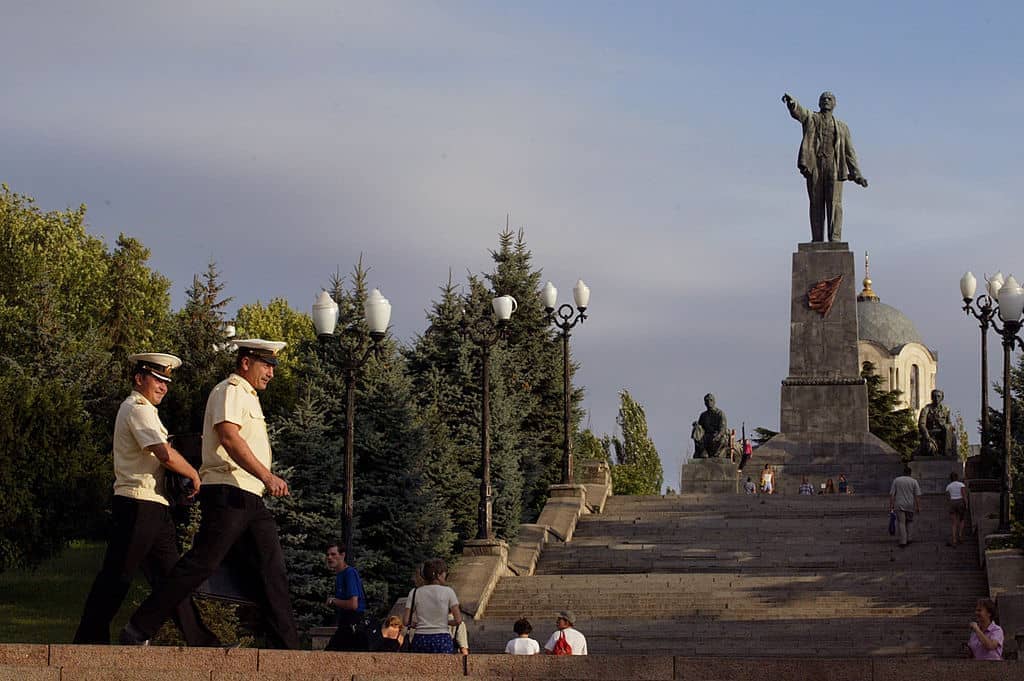In his hour-long speech earlier this week setting out why he was invading Ukraine, Vladimir Putin blamed Vladimir Lenin, the collapse of the Soviet Union, Ukrainian nationalists and the West for starting the conflict. Meanwhile, many in the West believe that the conflict is entirely the creation of one man, Putin himself. It’s worth though remembering the post-Soviet roots of the current Russian-Ukrainian war and how close the two nations came to blows 30 years ago.
After the failure of a reactionary coup in Moscow in August 1991, the victorious Russian democrats led by Boris Yeltsin wanted to dismantle the Soviet Union’s ‘totalitarian empire’ and join Nato. The main challenge to their plans was not the Soviet Union’s defeated KGB and generals, but the ever-present danger of Russian nationalism filling the vacuum left by communism. The fear was that the Soviet Union would follow the path of Yugoslavia and descend into violent ethnic conflict.
Just days later, in Kyiv, Ukrainian leaders, most of them communist apparatchiks, immediately declared their independence. They also announced that their independence and sovereignty were final and unconditional; and they had no territorial claims over Russia and other post-Soviet republics. In Moscow even some liberal democrats were startled by this declaration. The borders of Ukraine and the Russian Federation, the two largest republics in the Soviet Union, had been drawn up by Lenin and Stalin, and Khrushchev transferred ‘Russian Crimea’ as a gift to the Ukrainian Soviet republic in 1954. The Ukrainian leaders were now declaring that Crimea unconditionally belonged to the new Ukrainian nation.
The recently elected Russian President, Boris Yeltsin, was also upset. He had expected Russia and Ukraine to stay in some kind of a union, much like England and Scotland. He ordered his press secretary to announce that if Ukraine wanted to go it alone, then Russia would have its own territorial claims in the region. At a press-conference in Moscow a Ukrainian journalist called this a continuation of communist imperialism. Yeltsin’s media man snapped: ‘You don’t want to live with Russia in a union? This is a communist legacy for you? Then go, but return Crimea and Donbass to us! Because they became part of Ukraine because of the “communist legacy”!’
In the following weeks, the media in Moscow and Kyiv exchanged barbs and dire scenarios of war were predicted. The Moscow-based Independent Gazette published an op-ed piece where the author compared Russia’s claims to Crimea and Donbass to Hitler’s invasion of the Sudetenland in 1938. Another author wrote that if Russia decided to claim territories from other republics, ‘the Yugoslav scenario would be guaranteed for us.’ Two ‘Russian empires’ were gone, this author prophesied, one in 1917, another in 1991. The Russian Federation would suffer a similar fate if it embarked on this imperialist course.
The smartest of Russian liberals realised then that the dispute with Ukraine could bury the prospect of Russian democracy under a deluge of nationalist resentment. American and British diplomats in Moscow agreed. They reasoned that because Russians considered Ukraine to be a part of their historic and cultural patrimony, they needed more time to come to terms with the ‘divorce’. Galina Starovoitova, a liberal politician, advised Yeltsin to negotiate with Kyiv a special status for Crimea, with a proviso to hold a referendum on the peninsula in a few years. This option would have placated the Russian public and left open the possibility of settling the territorial issue according to international law.
Yeltsin shrugged it off. He had to build a new Russian state, obtain western recognition and credit, and negotiate with his Ukrainian counterpart Leonid Kravchuk about what to do with the Soviet Union’s nuclear weapons. Yeltsin also believed that Russia had sufficient political and economic means, above all cheap gas and oil, to influence Kyiv’s policies and choices, so didn’t have to worry about its political independence. He recognised Ukraine’s sovereignty and territorial integrity unconditionally.
The first Russian-Ukrainian flare-up occurred just days after the dissolution of the USSR. The Ukrainian leadership, in an attempt to create its own army and navy, asked officers of the ex-Soviet Black Sea Navy, with the main base in Sebastopol, Crimea, to take a new oath to Ukraine, in Ukrainian. Some officers rebelled, and nationalist politicians in Moscow called for a separation of Crimea from Ukraine. Yeltsin and Kravchuk had to meet again to settle the issue.
It is clear now though that the issue was never truly settled. Last Monday Vladimir Putin repeated almost verbatim the words of Yeltsin’s press secretary to the Ukrainians in August 1991: ‘You want decommunisation? Very well, this suits us just fine. But why stop halfway? We are ready to show what real decommunisation would mean for Ukraine.’ Putin’s resentment is now no longer limited to Crimea and Donbass. He meant that the whole of Ukraine was the product of communist experiments and was a failed state, up for grabs. And on Thursday morning, he sent Russian troops across Ukraine’s border from the north, east, and from the Crimea.
What happened 30 years ago is not a cause of today’s crisis, but it should help us to see the conflicts depth and stakes. Politicians regularly misuse history for their own goals. An absolute ruler, immune to checks and balances, can misuse history disastrously. And the outcome of Putin’s ‘reading’ of the history of 1991 is war. For now, he claims that his mission is ‘demilitarisation’ and ‘de-Nazification’ of Ukraine, not its occupation. In Washington, Joseph Biden says that Putin decided to restore the Soviet Union. One thing is clear: Putin is ready to stop at nothing ‘to correct history’. This is perhaps the most dangerous obsession of his time in power.






Comments